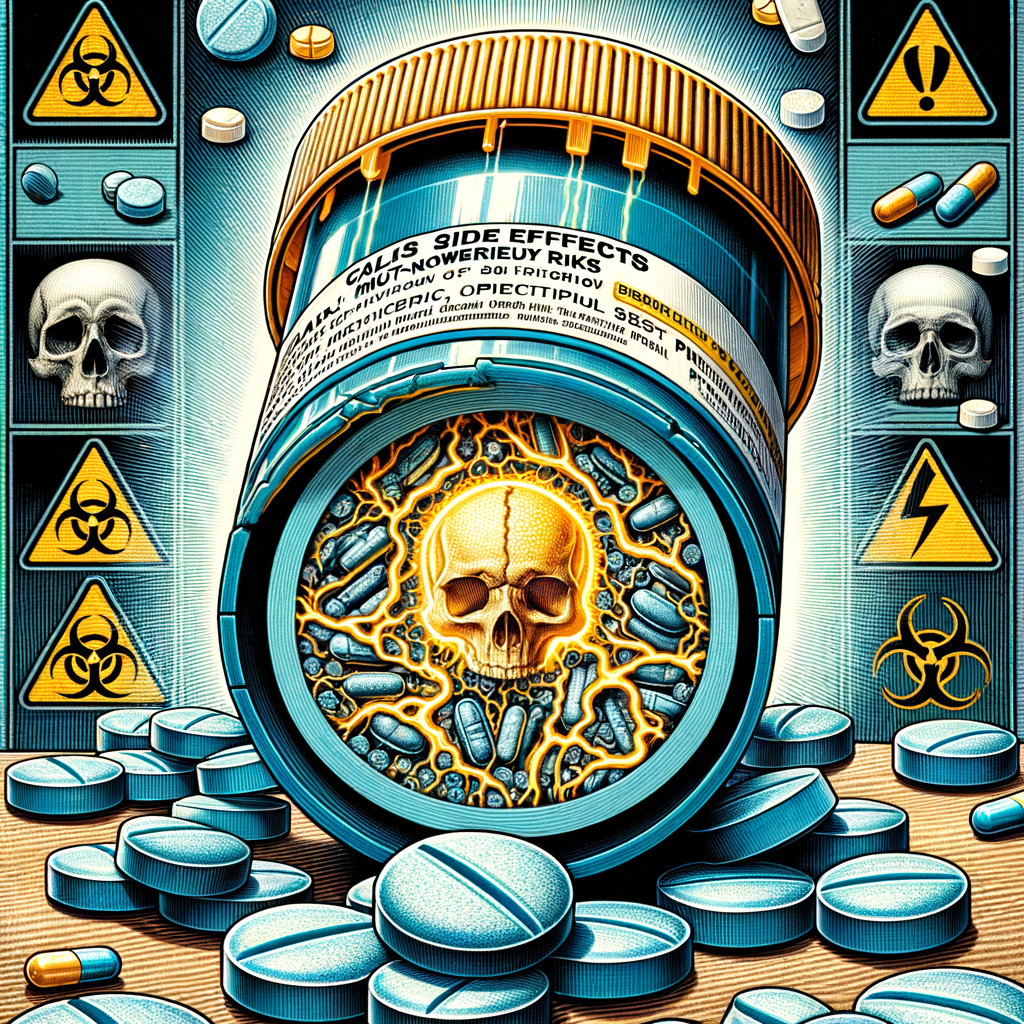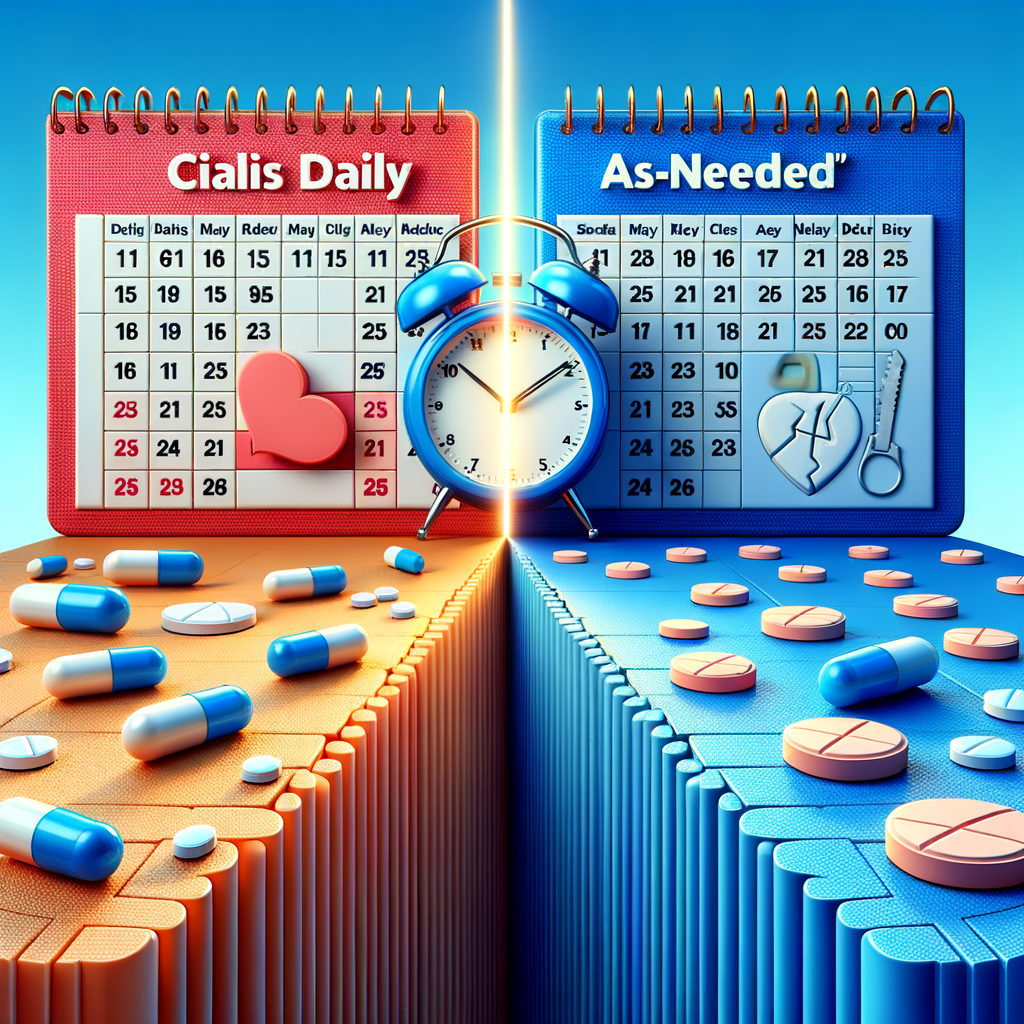Introduction: Why You Should Read This
Cialis (tadalafil) helps many men with erectile dysfunction and enlarged prostate. However, it can cause side effects, some of which become serious. Therefore, you should understand the major risks before taking it.
I wrote this article to help you spot danger signs. In addition, I’ll explain interactions, who faces higher risk, and what to do if problems occur. Read on to stay safe and informed.
How Cialis Works — A Quick Overview
Cialis relaxes blood vessels and smooth muscle tissue by inhibiting the PDE5 enzyme. As a result, blood flow to the penis increases, which helps achieve and maintain an erection. The drug also relaxes the prostate and bladder muscles, easing urinary symptoms linked to benign prostatic hyperplasia (BPH).
Generally, Cialis starts working within 30 to 120 minutes. It lasts longer than some other ED drugs, often up to 36 hours. Therefore, people call it the “weekend pill.” Still, longer duration also means side effects can persist.
Common, Mild Side Effects
Many people experience mild side effects. These include headache, flushing, indigestion, nasal congestion, muscle aches, and back pain. Usually, these effects begin soon after the dose and fade within a day.
You can manage most mild effects with rest, fluids, and over-the-counter pain relief. However, if symptoms worsen or persist more than 48 hours, contact your healthcare provider. Also, never ignore any new or severe symptoms.
Serious Cardiovascular Risks
Cialis can affect blood pressure and heart function. Consequently, people with heart disease face higher risks. For instance, sudden drops in blood pressure can cause fainting, lightheadedness, or even a heart attack.
Moreover, nitrates, commonly prescribed for chest pain, interact dangerously with Cialis. Combining the two can cause a severe and life-threatening fall in blood pressure. Therefore, never take Cialis with nitrates. If you have chest pain after taking Cialis, seek emergency care.
Stroke and Heart Attack: What You Need to Know
Although rare, strokes and heart attacks have occurred after using Cialis. Often, these events happen in men who already had cardiovascular risk factors. These include high blood pressure, high cholesterol, diabetes, smoking, and existing heart disease.
Therefore, doctors typically evaluate cardiac health before prescribing Cialis. They may perform an exercise test or other assessments. If you have new or worsening chest pain, shortness of breath, fainting, or unusual sweating after sex or drug use, call emergency services right away.
Priapism — Prolonged, Painful Erection
Priapism means an erection lasting more than four hours. It represents a medical emergency. If not treated within hours, priapism can cause permanent tissue damage and infertility.
Although priapism is rare with Cialis, it does occur. Men with sickle cell disease, leukemia, or severe obesity face higher priapism risk. If your erection lasts longer than four hours, go to the nearest emergency room immediately.
Vision and Hearing Loss
Cialis has been linked to sudden vision and hearing loss in rare cases. Specifically, some users experienced non-arteritic anterior ischemic optic neuropathy (NAION), which damages the optic nerve. Similarly, sudden hearing loss with tinnitus has been reported.
If you experience sudden decreased vision or hearing, stop Cialis and seek medical care immediately. Early evaluation might improve outcomes. Furthermore, avoid Cialis if you have a history of NAION.
Severe Allergic Reactions
Serious allergic reactions to Cialis are uncommon. Still, they can occur. Symptoms include rash, itching, swelling of the face or throat, difficulty breathing, and dizziness.
If you experience these signs, stop the medication and call emergency services. Additionally, inform your doctor about any drug or food allergies. They may recommend an alternative treatment.
Drug Interactions That Increase Serious Risk
Several medications interact dangerously with Cialis. First, nitrates and nitric oxide donors cause severe hypotension when combined with PDE5 inhibitors. Second, alpha-blockers for prostate or blood pressure treatment can also drop blood pressure when used together.
In addition, strong CYP3A4 inhibitors such as ketoconazole, ritonavir, and certain antibiotics can increase Cialis levels. Consequently, the risk of side effects rises. Also, grapefruit juice affects CYP3A4 and may elevate drug levels. Always tell your physician about all your medications and supplements.
Who Should Not Take Cialis: Contraindications
Certain conditions make Cialis unsafe. Do not use it if you currently take nitrates for chest pain. Also, avoid it if you recently had a heart attack or stroke. In addition, men with severe liver disease or very low blood pressure should not take Cialis.
Moreover, doctors use caution in men with certain eye conditions, such as NAION. If you have history of sudden vision loss, discuss alternatives. Finally, men taking potent CYP3A4 inhibitors need dose adjustments or different medications.
Risk Factors That Increase the Chance of Serious Side Effects
Age matters: older adults often have more heart disease and take more medications. Consequently, their risk for adverse events increases. Similarly, people with diabetes, uncontrolled high blood pressure, and high cholesterol face higher risk.
Also, lifestyle factors such as smoking and heavy alcohol use compound cardiovascular risk. Furthermore, illicit use of other erectile agents or recreational drugs, like stimulants, raises danger. Always disclose your full medical history and habits to prescribers.
Dose, Timing, and How They Affect Safety
Cialis dosing ranges from low daily doses to higher on-demand doses. Daily low doses reduce peak blood levels, making side effects less intense. Conversely, higher on-demand doses result in stronger effects and more likelihood of side effects.
Therefore, doctors individualize dose based on health, age, and other medications. If you experience side effects, they may lower the dose. Also, never exceed the prescribed dose. Taking extra pills increases the risk of serious events.
What to Do If You Experience Serious Side Effects
If you feel chest pain, severe dizziness, fainting, or shortness of breath, call emergency services immediately. Likewise, seek urgent care for sudden vision or hearing loss. For a prolonged painful erection, go to the nearest emergency room.
After acute care, notify your prescribing physician. They will re-evaluate your treatment plan. You may need tests, cardiology referral, or an alternative ED therapy.
Monitoring and Tests Before and During Treatment
Before starting Cialis, your clinician should review your medical history and perform a physical exam. They may check blood pressure, heart rate, and possibly order blood tests. For older patients, more thorough cardiac evaluation may be necessary.
During treatment, report any new chest pain, fainting, or other worrying symptoms. Periodic follow-up helps spot problems early. Also, inform the clinician about any new medications or supplements you start.
Safe Use Tips to Lower Risk
First, avoid nitrates entirely while taking Cialis. Second, limit alcohol and avoid heavy meals before sex. Both can worsen low blood pressure. Third, avoid grapefruit and certain drugs that increase tadalafil levels.
In addition, start with the lowest effective dose. Also, disclose all medical conditions and medications to your prescriber. Finally, avoid combining Cialis with other erectile drugs or recreational stimulants.
Comparing Serious Side Effects: Cialis vs. Other ED Drugs
Here is a simple table comparing severe risks among common ED medications:
| Risk Type | Cialis (tadalafil) | Sildenafil (Viagra) | Vardenafil (Levitra) |
|———–|——————–|———————|———————-|
| Heart-related events | Rare, possible | Rare, possible | Rare, possible |
| Priapism | Rare | Rare | Rare |
| Vision loss | Rare | Reported more with sildenafil | Rare |
| Hearing loss | Rare | Rare | Rare |
Although risks align broadly across drugs, individual responses vary. Therefore, your doctor will choose the best option for your health profile.
Alternatives to Cialis
If Cialis poses too much risk, consider alternatives. Lifestyle changes like weight loss, exercise, smoking cessation, and limiting alcohol can improve sexual function. In addition, psychological therapy helps when anxiety or depression contributes to ED.
You can also try other medical options. These include vacuum erection devices, penile injections, intraurethral suppositories, and penile implants. Each option has its own risks and benefits. Discuss them with your urologist.
How Physicians Assess Cardiovascular Risk Before Prescribing
Doctors follow guidelines to judge cardiac risk related to sexual activity. They assess exercise tolerance, recent cardiac events, and overall stability. If a patient can handle moderate physical exertion, they often allow treatment with ED drugs.
However, if a patient has unstable angina, uncontrolled hypertension, or recent myocardial infarction, physicians avoid prescribing Cialis. In such cases, they focus on stabilizing heart disease first. Then they may reconsider ED treatment.
Special Populations: Older Adults, Women, and People with Liver or Kidney Disease
Older adults often take multiple drugs and have coexisting conditions. Thus, clinicians adjust the dose and monitor closely. Kidney or severe liver disease also requires dose adjustments or avoidance.
Although Cialis can be used in some women for pulmonary arterial hypertension, men primarily use it for ED and BPH. Women seeking treatment for sexual dysfunction should follow specific guidance from their clinician.
Legal, Quality, and Illicit Use Concerns
The market contains counterfeit ED drugs. These may contain incorrect doses or harmful substances. Therefore, buy Cialis only from licensed pharmacies and verify prescriptions. Also, online sources that sell without prescription often ship counterfeit products.
Illicit combinations with other substances increase risk. For example, mixing Cialis with nitrate-laced street drugs can cause catastrophic drops in blood pressure. Always follow medical guidance and avoid unregulated products.
Recognizing Myths vs. Facts
Many myths surround Cialis. For example, some believe it causes permanent vision loss in all users. That claim lacks evidence. Instead, vision loss is rare and usually occurs in people with preexisting risk factors.
Similarly, myths suggest ED drugs cause addiction. These medications do not produce chemical dependence. Nevertheless, psychological reliance can develop. If you feel dependent, discuss it with your healthcare provider.
Practical Checklist Before Taking Cialis
– Get a full medical history and medication review.
– Discuss cardiovascular risks and exercise tolerance.
– Avoid nitrates and inform your doctor about alpha-blockers.
– Start at the lowest effective dose and follow up after use.
– Buy from a licensed pharmacy and avoid unverified online sellers.
When to Contact Your Healthcare Provider
Contact your clinician if you notice prolonged or painful erection, sudden decrease in vision or hearing, chest pain, severe dizziness, fainting, or severe allergic signs. Also, seek advice if common side effects worsen or do not resolve within two days.
Immediate medical help is essential for chest pain, sudden vision loss, or priapism. Do not wait. Quick care can prevent permanent damage.
Conclusion: Balancing Benefits and Risks
Cialis can improve sexual health and quality of life for many men. However, it carries potentially serious risks, especially for those with heart disease or those taking interacting drugs. Consequently, informed discussion with a healthcare provider is vital.
By understanding the risks, following dosing instructions, and monitoring for warning signs, you can reduce danger. Always report new symptoms promptly and buy medications through reputable sources.
Frequently Asked Questions (FAQs)
1) Can I take Cialis if I have stable heart disease?
Yes, many men with stable heart disease may take Cialis. However, your doctor must assess exercise tolerance and recent cardiac events first. They will advise if it is safe for you.
2) How long after taking Cialis should I avoid nitrates?
You should avoid nitrates for at least 48 hours after taking Cialis. For daily low-dose tadalafil, avoid nitrates for longer and follow physician guidance. Wait until the drug clears to prevent severe low blood pressure.
3) Is sudden vision loss reversible after taking Cialis?
Sometimes vision loss improves, but not always. Early medical evaluation may improve outcomes. Therefore, seek immediate care if you notice sudden vision changes.
4) Can women take Cialis for sexual dysfunction?
Cialis is not approved for female sexual dysfunction. In some cases, tadalafil treats pulmonary arterial hypertension in both sexes. Women should consult a specialist for appropriate therapies.
5) Does grapefruit juice make Cialis unsafe?
Grapefruit juice can increase tadalafil levels by inhibiting CYP3A4. Consequently, this raises the risk of side effects. Therefore, avoid large amounts of grapefruit while using Cialis.
6) What should I do if my erection lasts longer than four hours?
Seek emergency medical care immediately. Priapism can cause permanent damage if not treated. Do not attempt home remedies.
7) Can Cialis cause hearing loss permanently?
In some rare cases, hearing loss appears sudden and may be permanent. Immediate medical attention can help. Stop taking Cialis and see a healthcare provider if hearing decreases.
8) Are there safe alternatives if I take nitrates?
If you require nitrates, you should not take Cialis or other PDE5 inhibitors. Your doctor may suggest non-PDE5 options like vacuum devices, injections, or counseling. Discuss alternatives based on your medical needs.
9) How does alcohol affect Cialis safety?
Moderate alcohol use may be okay, but heavy drinking increases the risk of low blood pressure and fainting. Also, alcohol can worsen erectile problems. Limit alcohol around sexual activity.
10) Can Cialis interact with herbal supplements?
Yes. Some supplements affect liver enzymes or blood pressure. For instance, St. John’s wort can lower drug levels, while others may raise them. Always tell your provider about supplements.
References
– U.S. Food and Drug Administration — Tadalafil (Cialis) Information: https://www.fda.gov/drugs/postmarket-drug-safety-information-patients-and-providers/tadalafil-information
– American Urological Association — Erectile Dysfunction: https://www.auanet.org/guidelines/erectile-dysfunction-guideline
– Mayo Clinic — Tadalafil (Oral Route) Side Effects: https://www.mayoclinic.org/drugs-supplements/tadalafil-oral-route/side-effects/drg-20067624
– American Heart Association — Sex, Heart Disease, and ED Medications: https://www.heart.org/en/health-topics/sexual-health-and-the-heart
– National Institutes of Health — Drug Interactions with Tadalafil: https://pubmed.ncbi.nlm.nih.gov/23094652/
Note: This article provides general information and does not replace professional medical advice. Always consult a qualified healthcare provider about medications and personal health decisions.



